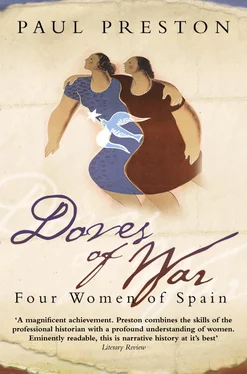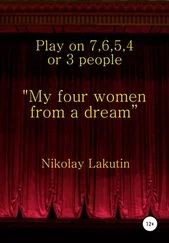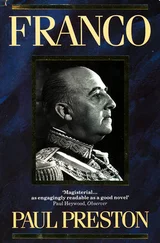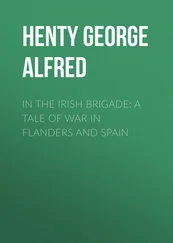When the military rebellion of 18 July 1936 precipitated the Spanish Civil War, Prince Alfonso de Orléans Borbón was in Bucharest on Ford business. He hastened to Burgos where he arrived on 2 August 1936. He offered his own and his sons’ services as pilots and was bitterly disappointed to be told that General Mola wished to avoid the uprising having a monarchist character. He was ordered to leave Spain. He then wrote to his friend, General Alfredo Kindelán, who had been named head of the rebel air force, and to Franco himself, pointing out that his two elder sons, Álvaro and Alfonso Orléans y Coburgo, had earned pilots’ licences in England in the Officers’ Training Corps. In consequence, at the beginning of November, they were able to join the Nationalist forces. However, Franco considered that Prince Ali himself was more useful to his cause in London. There he was able to facilitate the delivery of Ford trucks to the Nationalists. Moreover, Princess Bea was carrying on effective propaganda on behalf of Franco in establishment circles in Britain. She was also raising significant sums of money for food and hospital supplies for the Nationalist cause. Alfonso Orléans y Coburgo was killed on 18 November 1936. Flying as observer, his Italian Romeo Ro37bis biplane crashed while flying from Seville to Talavera de la Reina. The aircraft flew into a mountain at Ventas de Culebrín near Monesterio in the south of the province of Badajoz. In consequence, his younger brother Ataúlfo immediately volunteered. 26 Pip was devastated when, at a dance in New York in January 1937, she had been told of Alonso’s death. 27
In November 1936, Pip had sailed with her father for New York to stay with friends, a Mrs Wagner and her daughter Peggy. The trip would expand her horizons considerably. ‘I wonder what this year will bring me. I have a feeling lots. I hope so. I do wish Touffles would write.’ 28 He was constantly on her mind. ‘Last night’, she wrote on 3 January 1937, ‘I dreamed Touffles was terribly ill and all tied up in bandages and as white as a sheet. Oh dear oh dear. I wish he was not out in Spain in the war. God how foul wars are. Every time I think of Alonso it makes me feel sick and think of the cruel futility of it all. What a mess human nature is.’ The ‘divine’ Tyrone Power in a movie reminded her of Touffles. ‘I don’t suppose even if Touffles gets back from Spain alright he would ever want to marry an unattractive fool like me so I might as well stop wishing.’ Letters from him merely left her miserable and worried. 29 She wrote on 22 January, ‘I have put my new photo of Touffles up on my bed table and simply adore it. I am silly to let myself go on pretending he might love me one day because I know he won’t but I can’t stop myself being nuts over him so I might as well enjoy it as much as I can.’ New York was a regular round of cinema, theatre and nightclubs, punctuated by having her fortune told at the Gypsy Tearooms. As always, she maintained her interest in music, attending a concert by the violinist Josef Szigeti. Among several historic performances at the New York Metropolitan, she attended Rigoletto with Lawrence Tibbett in the title role, Die Walküre with Kirsten Flagstad and Lauritz Melchior, and Saint-Saëns’ Samson et Dalila with Gertrud Wettergren, as well as a Cavalleria Rusticana and Le Coq d’Or.30 Nevertheless, she was restless. ‘Life here is so idle and pointless that I am pining to have some work or something to occupy me. We just do nothing.’ She managed to persuade the Wagners that she had to leave in case Touffles returned from Spain. 31 While waiting for her passage home, she worried about her weight, and danced and flirted with an eligible young Cuban called Alvaro García.
Her passion for Touffles was boosted by the flirtation with García whom she had met at the Wagners’ home in New York. On 26 January 1937, the twenty-year-old Pip wrote in her diary:
I am so shocked at myself by my behaviour tonight and so bewildered by it all that I don’t even know if I enjoyed it. I went out with Alvaro to a Cuban place where we danced mambas ( sic ) until 4 o’clock in the morning. He dances divinely and it was grand fun. He made violent love to me the whole time and kissed me and I kissed him in the taxi home. But then he saw me up to the apartment and made such passionate love to me I was scared stiff. He even pulled down my dress and kissed my bosom which horrified me but I could not stop him. He did everything under the sun and I let him. I am certainly gaining experience but I don’t know if I like it.
By the next day, reflecting on the incident, she wrote: ‘The trouble with my flirtation is that all it has done is to wake me up and make me want Touffles to make love to me even more than I did before. Oh hell and damnation.’ 32 ‘Make love’, of course, meant rather less then, as this passage illustrates, than it does now.
Day after day, she wrote of missing Touffles. On 2 February, she wrote perceptively: ‘I think the trouble with all of us is our age and suppressed sex. I would like to have a hectic affair with someone but of course never will.’ The next night, however, she came very near. After a cocktail party and dancing into the early hours, ‘Alvaro took me home and came into the apartment where he made love to me on the sofa too divinely for words. It was heaven and again I behaved outrageously and let him do even worse things than before.’ She refused to have sex with him and was amused by the fact that he clearly believed her to be much more experienced than was actually the case. 33
On her return passage on the SS Paris , she wrote: ‘I hate to be all alone, I feel scared and depressed.’ Her essential insecurity was revealed in other diary entries. ‘Everyone on board is sweet to me and they all seem to like me so much. It is so lovely to know people like you. If only I have changed enough to make Touffles like me too.’ The round of cocktail parties and dancing terminated on the last night on board in a dramatic encounter with a French diplomat. ‘God knows why but this evening I went off the rails and was mildly raped. I can’t think why I let Mr Brugere do such a thing, I must have been crazy.’ Having been assaulted by the man on deck, she later went to his cabin, ‘so now I don’t know whether I am still a virgin or not. I think not. It was heavenly but frightening.’ She left his cabin ‘feeling very ashamed and yet all excited and happy in a way’. The event seemed to unleash a hitherto repressed passion. After a ‘hot’ encounter in a taxi with a film director ‘Frenche’ whom she met on the ship from New York, she wrote: ‘I seem to have become so damn oversexed that I just can’t stop myself. I don’t know whether it is suppressed sex bursting forth or my thyroid pills or what, but the effect is incredible for the erstwhile priggish me.’ On returning to Chirk, she took up riding with a vengeance. She started to dream about Touffles again. Life in London was an endless kaleidoscopic social round in which she occasionally bumped into ‘that filthy fucking Frenche’. She took singing and piano lessons, fenced most days, regularly went to the theatre and the cinema, often visited the hairdresser and fashion shows and consulted more fortune-tellers. Despite her sexual progress, she was still young enough to sit with friends and be scared by talk of ghosts. 34
In early March, Prince Ali appeared in London. Revealingly, Pip refused his dinner invitation to spend time with her father. ‘Papa and I get on so well. We talk for hours every evening. He knows so much about every subject. I wish I had his brains.’ When she did go to see Princess Bea, she found her heartbroken by the death of her son Alonso. Pip got news of her beloved Touffles who, as befitted the son of a German princess, had joined Hitler’s Condor Legion and was now flying as an observer in German bombers. As always, being reminded of Touffles provoked her into a flirtation. At a society hostess’s dance, she ‘spent most of the evening dancing with crazy Francis Cochrane to whom I got engaged just for fun. He is great fun and dances quite well. So now I have a fiancé for a change. I shall break it off again soon.’ Nothing more was heard of him thereafter. Her social life was more of a whirlwind than a roundabout. When she was not in the country, at the races or at Brooklands, she took every advantage of what London had to offer. A typical day would see her rise late, and after breakfast, practise fencing or do some work in relation to the small stud farm at Chirk. She would then lunch at the Ritz or the Savoy with friends. Lunch would be followed by shopping, a dress fitting, the hairdresser and then tea with some family friend. In the evening, she would attend one or more cocktail parties, a dance in the home of some society hostess or the theatre, the ballet or the opera, then dinner, perhaps at Quaglino’s or the Savoy Grill, then on to the Café de Paris or a nightclub. She attended a number of legendary operatic occasions, including Eva Turner and Giovanni Martinelli singing Puccini’s Turandot at Covent Garden. Dancing until the early hours of most mornings, she met lots of attractive men but nothing came of her flirtations with them. 35 When, on 24 March, she finally got a letter from Touffles requesting her photograph, she pranced down the passage ‘singing at the top of my voice’. Already thinking of going to Spain, she started Spanish lessons. 36
Читать дальше












